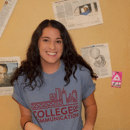On campuses around the United States, there have been initiatives made and achieved to provide their menstruating students with the free products they need. Universities like Brown, Minnesota, University of Vermont and Columbia College have all been providing free FHP.
Colleges in the greater Boston area are on that list as well. According to The Harvard Crimson, Harvard began supplying products in school housing this Fall. Due to student efforts, Northeastern started this Summer. So why has it taken Boston University so long to even begin working on this?
A picture from The Harvard Crimson article about Havard’s new tampon initiative.
Hayley Gambone had that exact same question during the start of her Freshman year. She couldn’t understand why condoms were offered for free on campus, even being delivered by request to dorms, but the basic necessity of tampons and pads still had a price tag.
Boston University has feminine hygiene dispensers in most female restrooms. Products can be purchased for a nickel a piece. In buildings like CAS, some dispensers have been seen unlocked and empty, almost as “a taunting feeling of just how unimportant this issue is to the administration,” according to BU sophomore student, Olivia Hartman.
A dispenser in CAS shown to be opened and empty.
Instead of being discouraged, Gambone became motivated to solve this problem for her peers. After a year of researching the issue, and meeting with maintenance staff (as well as Dean Elmore) last April, Gambone drafted a 4-page proposal which she planned to share with Dean Elmore at their most recent meeting last Thursday.
According to Gambone, in short, her proposal is to “have all 7 women’s bathrooms in the CAS building to have a new coin-free dispenser installed with regularly stalked tampon and pads in them. My goal for this to act as a pilot for the rest of the university,” she added. “The ultimate goal is to get them everywhere — my goal is to get them in CAS.”
Free The Tampons is a foundation whose main purpose is to advocate for women to have free FHP at work, school and in public restrooms. According to a national study conducted by Free The Tampons, 86 percent of US women between ages 18-54 years have unexpectedly started their period in public without the products they need.
Statistics gathered by Free The Tampons.
The statistics provided by Free The Tampons helped Hayley with her own proposal and provides numerical insight into just how prevalent this issue is.
“Women can’t spend as much time in productive spaces as men when they are faced with this unexpected problem,” said Gambone. “There are a lot of people on campus. Chances are it happens every day. If the university has the resources to combat that, then they should.”
Gambone is not alone in her frustrations and in having ambitions to fix this problem on campus. On Sunday, September 23rd, 10 students, including Gambone, all representing different organizations at BU, came together to talk about what should be done.
Members of The Feminist Collective, Student Government, The Center and BU Reproductive Health & Policy Advocates(RHPA) realized that their voices are stronger together. The administration is listening to Gambone’s voice.
Free tampons offered by The Center For Gender, Sexuality and Activism. It is one of the few spots where free feminine hygiene products are available.
Joanna Wagner, a Junior in CAS and a member of RHPA, was in support of what Hayley was trying to accomplish. She told her, “You’re so much farther along in your proposal and any support that you need, any initiative that has forward movement, we are here for you.”
The group instantly started brainstorming campaign ideas and strategies to gain supporters and awareness, but before anything could be implemented, the meeting between Dean Elmore and Hayley Gambone needed to happen.
At the meeting, Gambone was planning on giving a presentation and showing Dean Elmore her proposal. According to Gambone, she never had the chance to do either.
“He told me that he wants to take it to Innovate@BU and that he wants a team of students and professors to research logistics to think of a good plan to implement it for the entire university,” said Gambone.
Innovate@BU is a program which provides students with the tools and access to solve a problem creatively, start a business, or to create something. Boston University has invested 20 million dollars in this program.
The logo for Innovate@BU
Katherine Cornetta, the assistant to Dean Elmore, described Innovate@BU as “our innovative and entrepreneurial arm of the university, which tries to get students involved in a variety of ways and is always asking for on-campus projects for students to work on.”
Gambone was hesitant and frustrated at first about Innovate@BU being involved. Her biggest concern was time. She said, “Taking this whole idea and applying it to something so large is hard to achieve right now and this is something we need right now.”
When asked about a timeline for how long Innovate@BU would take, Cornetta said it could happen by January or by the summer of next year and that it all depends on how quickly a plan is drafted and implemented.
Gambone is anxious to get started but also happy she has finally been given the resources and support to achieve her goal.
“People aren’t going to just stop getting their period,” said Gambone, “Providing free pads and tampons need to happen now and BU students are more than deserving of it.”
Want to keep up with HCBU? Make sure to like us on Facebook, follow us on Instagram, check out our Pinterest board, and read our latest Tweets!
Correction: Blake Sims’ quote has been removed due to the request of Innovate@BU. We have reached out to them for a corrected quote.



